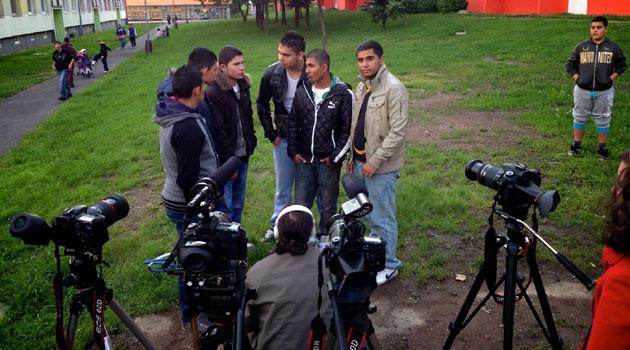Czech documentary by Roma about Roma celebrates success at French Institute

On Monday 12 May about 100 people gathered in the cinema at the French Institute in Prague for the premiere of three documentary films created as part of a project called Europe: A Roma Homeland, which will result in a five-part feature-length documentary, "Our Dream". One of the films screened was a Czech documentary called "Because There Is Hope" (Protože je naděje), which tells the story of Jožka Miker, an activist with the Konexe organization, and a group of Romani youth from Krupka whom he has taken under his wing.
The first documentary screened that evening came from Romania, "A Tale of Two Villages", which captured the rapidly-spreading phenomenon of the Pentecostal movements that are winning more and more followers among Roma and other communities there. The film shows that a strong religious factor is a possible source of the change that people have been waiting for there for so long.
At the start of the second documentary – "Home is Home", from Slovakia – the filmmakers take us back to March 2012, when a fire devastated the Krásná Hôrka Castle not far from the Hungarian border. This event greatly escalated tensions in the village of Krásnohorské Podhradie because the fire was alleged to have been accidentally set by two boys from the nearby Roma settlement, and shows the growing animosity and intolerance of the Slovak majority toward Romani people in the efforts of Štefan Szaniszló, a local man who gives a plot of land on which several Romani families have built their homes to right-wing extremist Marian Kotleba so the neighborhood can be "cleansed" of them.
The screening closed with the Czech film "Because There Is Hope", in which we follow the admirable enthusiasm of Romani activist Jožka Miker from the northern Bohemian town of Krupka for awakening young people’s Romani identity, a self-awareness that has already been written off, to a great extent, by everyone else around them. Through hip-hop and rap, the Romani youths report that they are here and that they are very much aware of the negative mood of society against them.
By performing, the youths strive for Romani equality and for majority-society acceptance. Jožka, as their guide and mentor, leads the boys toward an interest in Romani culture and history, discussing current events related to coexistence between the majority society and Romani people with them.
Krupka and the surrounding towns have experienced several violent neo-Nazi demonstrations and incidents in recent years. One of these resulted in the murder of a young Romani man in the nearby town of Teplice.
Jožka leads the boys to establish their own goals in life and to stay away from drugs and violence. By beginning to rap about drugs, neo-Nazism, life in the residential hotels and poverty, they are becoming young activists.
The Czech documentary was created by František Bikár, Martin Grinvalský, Adéla Zicháčková, Viera Lacková, Jarmila Balážová and intern Emmie Bultemeier. The team was led by documentary filmmakers Josh Meltzer (Western Kentucky University) and Rich Beckman (University of Miami, Florida).
After the screening there was a debate with the audience featuring one of the producers of the Czech film, František Bikár, its main figure, Jožka Miker, and Rich Beckman. At the very end of the evening three of "Jožka’s boys" from the band De La Negra performed a rap.
The feature-length documentary "Our Dream" will draw attention, in five chapters filmed in Central and Eastern Europe, to the problems that Romani people face in Europe. All five films were made by teams of non-Romani and Romani journalists collaborating with professional American documentary filmmakers.
The films were created as part of a project called Europe: A Homeland for the Roma, which is being implemented by Transitions Online in collaboration with organizations in five European countries. Production of the Czech part of the documentary was provided by the ROMEA, o.p.s. organization.
The project was created thanks to financial support from the European Union’s Fundamental Rights and Citizenship Programme. The ERSTE Foundation also provided support.